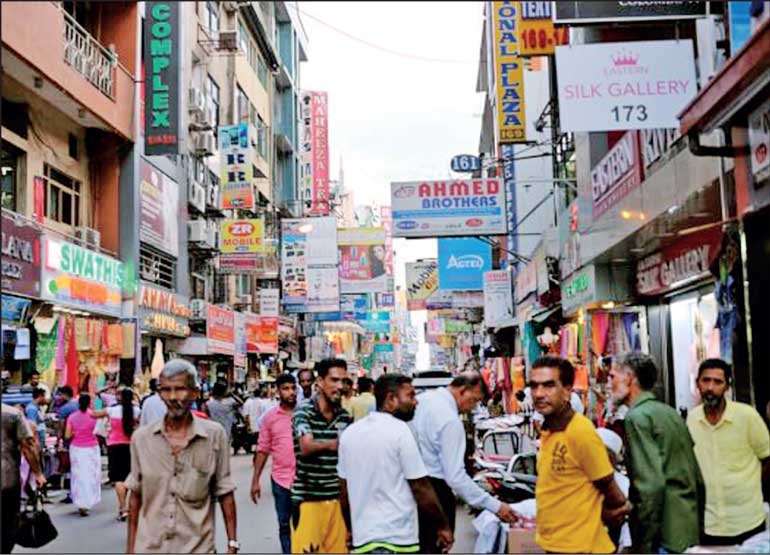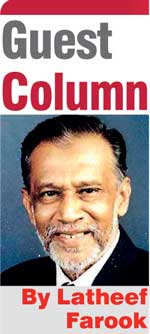Sunday Feb 22, 2026
Sunday Feb 22, 2026
Saturday, 19 November 2022 00:01 - - {{hitsCtrl.values.hits}}

Sri Lankans are suffering not due to a natural disaster like tsunami but due to manmade blunders
 Sri Lanka is fast losing its independence gained in 1948 after four centuries of Portuguese, Dutch and British colonial rules.
Sri Lanka is fast losing its independence gained in 1948 after four centuries of Portuguese, Dutch and British colonial rules.
This is the unfortunate consequence of political instability, economic collapse and bankruptcy causing the worst ever hardships to people of all walks of life for the first time in known history.
This calamity was caused due to normalised corruption, mismanagement and short-sighted and destructive racist politics. Thus Sri Lankans are suffering not due to a natural disaster like tsunami but due to manmade blunders.
Economic collapse forced the country to turn to foreign aid to tide over the situation. This has inevitably forced the Government to meet donors’ demands compromising the island’s freedom and sovereignty.
For example, since January this year, India has committed more than $ 3 billion in loans, credit lines and credit swaps and emerged as the top lender to Sri Lanka in 2022. In return India got control over numerous strategic projects in the island.
For example, India is reengaging and attempting to tilt the balance in a strategic tussle with China on the island, a pivotal battleground because it lies on key global shipping lanes and plays into New Delhi’s fear of encirclement from its Asian rival. At the forefront of those efforts is Adani, who is a long-time supporter of Indian Prime Minister Narendra Modi, and has been accused by some Sri Lankan lawmakers of signing opaque port and energy deals closely tied to New Delhi’s interests.
On 30 September 2021, the Gujarat-headquartered Adani Group signed a Build Operate Transfer (BOT) agreement with Sri Lanka’s largest listed company John Keells Holdings and the Sri Lanka Ports Authority (SLPA) to jointly develop the Colombo West International Container Terminal (CWICT) at the strategically advantaged Colombo Port, located amidst one of the busiest shipping routes in the world. As per the 35-year-long BOT agreement inked by the three parties, the Adani Group will have majority, 51%, stakes, while John Keells would hold 34%, and the SLPA, 15%. The more than $ 700 million investment is said to be the largest foreign investment in the island nation’s port sector. (Courtesy – The Hindu).
In early 2022, Adani quietly signed memorandums of understanding to build 500 megawatts of renewable energy projects in Pooneryn and Mannar, other northern districts close to India. The renewable power plants, thrusting them into the heart of an international political clash.
Meanwhile, discussions were underway to set up a refinery at Sri Lanka’s Trincomalee Port. Publicly traded Lanka IOC, a unit of Indian Oil Corporation and state-run Ceylon Petroleum Corporation own 49/51% stakes in Trinco Petroleum Terminal Ltd., which control 51 tanks in a World War II era tank farm by the Trincomalee Port. Trincomalee is the second largest non-tidal natural harbour in the world, with the potential of becoming an energy hub.
In fact Indian financial assistance, its investment and control on prime projects in the island needs to be viewed in the context of its declared policy towards the island. For example, successive Indian governments, since India’s independence in 1947, have had a common agenda on all its neighbours including Sri Lanka, as stated by Indian diplomat K.A. Panicker.
Decades ago Sri Lankan diplomat K. Godage pointed out that India’s policy towards Sri Lanka was clearly highlighted under ‘Panikkar Diplomacy’, which wanted Sri Lanka to become an integral part of India’s defence structure.
This policy continued in the subsequent years.
Highlighting this policy after Bharatiya Janata Party, BJP, came to power in 2014, BJP leader Ram Madhav told in an interview with Qatar based Al Jazeera Television that India’s border is with Afghanistan in the west and Thailand in the east.
The message was clear.
Yet the Rajapaksa regime allowed Hindutva organisations with their extreme hostile agenda towards Muslims not realising the damage they could cause to communal harmony.
Reiterating this expansionist policy the news service WIRE on 14 February 2021 stated that Tripura chief minister Biplab Deb has claimed that Prime Minister Narendra Modi’s right hand man Amit Shah has plans to form BJP Governments in Nepal and Sri Lanka.
In the opening paragraph of Chapter 19 in the book ‘Sri Lanka: ‘The War Fuelled by Peace’ Palitha Senanayake said, “If Sri Lanka is to solve the ‘Tamil problem’ once and for all, it has to physically drag the island away from its present location and locate it in a place away from the ambit of India. This is because India is so intricately involved in this problem and Sri Lanka’s proximity to India has everything to do with it.”
Similarly China and other countries too entered the island. In the case of loan from China, projects such as Colombo Port deal, road network cricket stadium, conference hall, lotus tower and the like on higher interest rates proved disastrous.
Sri Lanka was not in need of a port in Hambantota with loans on high interest rates. Instead under China’s Belt and Road Initiative China needed a port to ensure interrupted supply of oil and its economic expansion in the region and Africa.
However China also managed to penetrate into the island.
The United States, which reported to have toppled the democratically elected immensely popular government of Prime Minister Imran Khan and installed a group of people known for their corruption in power, has its own agenda for South and South East Asia to counter China’s growing influence. Sri Lanka is no exception especially in the context of Chinese presence in the island.
In the midst of Israel, an international pariah protected and promoted by the US and Europe to destabilise the Middle East, also entered the country with its own agenda which could trigger communal tension.
Israel is a country which once trained both LTTE cadres and Sri Lankan soldiers in the same area at the same time and described Sri Lankans as monkey looking people. However Israel was given so much importance that it was given a special channel in the local TV network to propagate its lies, deception, political and religious agenda. But Muslims, sons and daughters of the soil, were deprived of an existing Islam channel, PEACE TV, conducted by Dr. Zakir Naik, the undisputed scholar on comparative religion in the world. Thus the island has become a playground for regional and international powers.
Meanwhile Sri Lanka is awaiting the International Monetary Fund to provide a loan though many believe that Sri Lanka’s current problem cannot be solved with foreign aid but with local initiatives.
In this regard it is worthy to note how almost a quarter century ago Malaysia’s former visionary Prime Minister Dr. Mahathir Mohamed tackled the economic crisis faced by his country during the Asian Financial Crisis.
Mahathir Mohamed defied the International Monetary Fund and got Malaysia out of the crisis. Commentators said Mahathir was proven right in his rejection of the IMF and understanding of the foreign agendas in taking over control of the central bank of Malaysia.
Do we have a Mahathir Mohamed to save the country out of the current economic crisis?